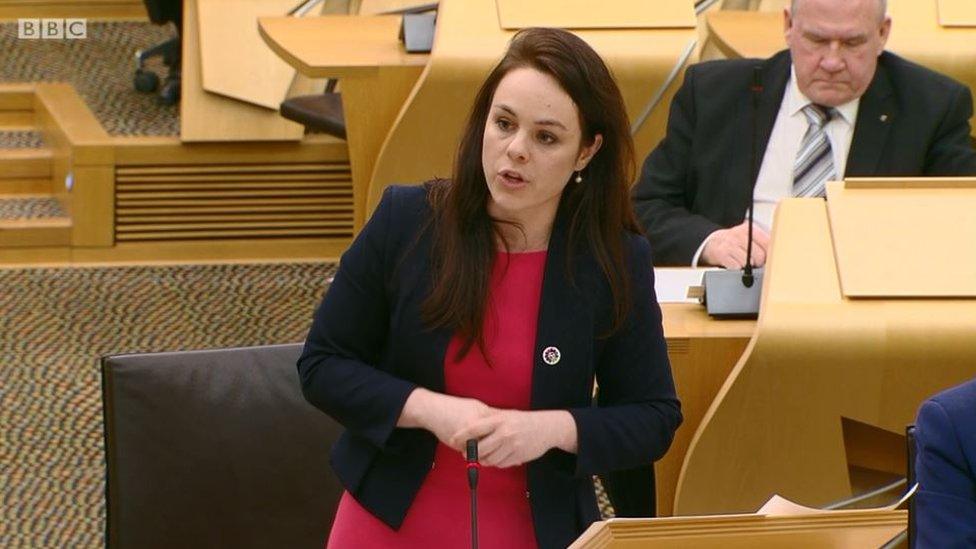Thunberg ahoy! Turning the oil tanker
- Published
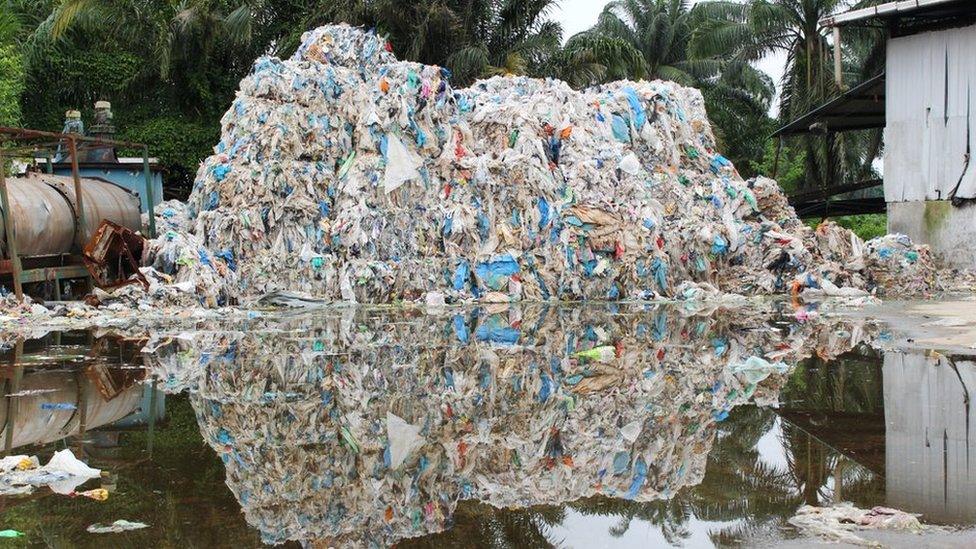
Consumer and government pressure is growing on oil and gas producers. They've seen off protests before, but this time could be different and permanent, and there are signs that they know it.
In addition to emissions, plastic has become a dirty word - the reaction from Grangemouth is that Ineos sees producing being separate from environmental impact of waste.
Shell has chosen to prioritise conventional oil and shareholder return over a transition in energy. More acreage of UK seabed has just been released for drilling.
Government has to decide what climate emergency will mean, in transport taxation and in constraining the oil and gas industry. The industry, for its part, is stepping up efforts to align itself with the climate change campaign.
A Swedish teenager with an unnerving calm and clarity of message, delivered in her second language, has governments and industries quaking. The campaign she leads has climate emergencies being declared, the first national one by Nicola Sturgeon.
No industry is more at risk from the growing pressure for radical change than the oil and gas industry. Deirdre Michie, chief executive of Oil and Gas UK, representing and leading the industry, said on Tuesday it's listening to Greta Thunberg, and also wants to act for a better world.
The oil industry has seen green activists before, and it's seen them off. A recent trawl through the archives for BBC Radio 4 reflected on the fact that oil majors knew emissions were causing damage to the atmosphere, and potentially to climate, before scientists had started publishing research on it, back in 1975.
Is this time going to be any different? Perhaps. There is now a credible alternative to oil-fuelled transport, through battery power, and it may be emerging as a technology faster than you'd think possible. Don't forget that the transition from horse-drawn to horseless carriages was not gradual.
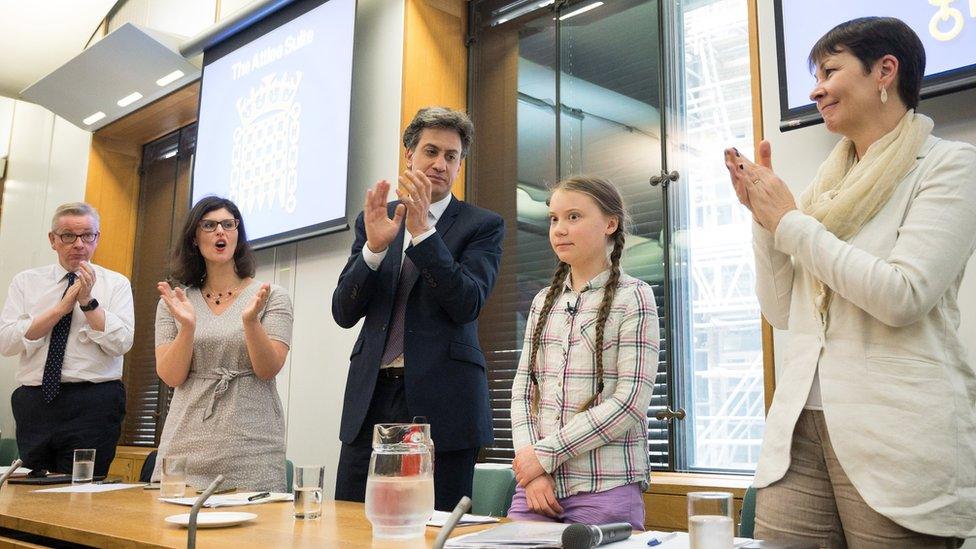
Greta Thunberg has started an international youth movement against climate change
The Attenborough effect is also galvanising people into action. The Blue Planet 2 whale with its calf apparently killed by ingesting plastic drew attention to the despoiled state of the oceans. Not only emissions from burning fossil fuels, but detritus from the throwaway economy, is focussing minds of consumers, and therefore also politicians and producers.
So maybe this time will be different. But on the evidence of one day's news, on Tuesday, it'll take a long time to turn this oil tanker round.
Plastics
Shell set out a strategic review which included a commitment to investment in electricity generation. The Dutch-British oil major didn't say if that's in renewables, but oil companies have been making significant moves in that direction.
But that's only the last of its reset priorities. The others show little sign of a change of focus. It remains oriented not to conventional oil and gas extraction, but shale and deepwater.
Downstream, it wants to continue being a big player in petrochemicals, at a time when plastics production is no longer the clean industry you perceive from the polythene wrap.
A campaigning BBC TV programme against plastic waste fronted by Hugh Fearnley-Whittingstall has this week pitted him against Ineos at Grangemouth, with senior director Tom Crotty dismissing the programme's approach as "pathetic". The question for both campaigner and producer is whether the disposal of plastic waste can be wholly separated from its manufacture.
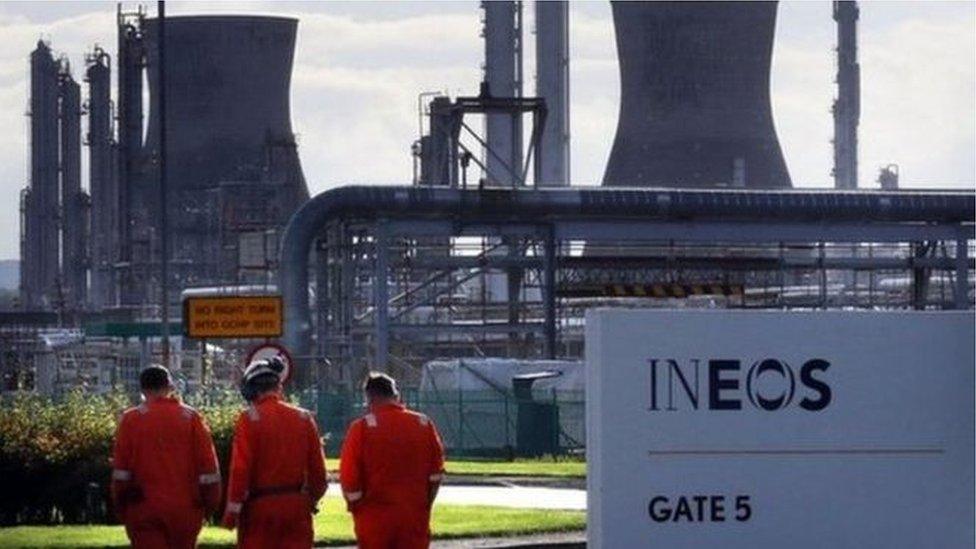
Ineos bosses have become emroiled in a row with TV chef and environmental campaigner Hugh Fearnley-Whittingstall
The big change for Shell is not that it is re-directing its efforts to meet consumer pressure, but that it's opened the taps on a far higher return to shareholders, through dividends and buy-back of shares.
In 2011 to 2015, that amounted to $52bn. In 2016 to 2020, it's up to $90bn. From 2021 to 2025, it is targeting a staggering $125bn for shareholders.
However, the chief executive acknowledged it can't all be about shareholders. He told Bloomberg business news: "We want to position the company for the future of energy. The future will involve oil and gas, by the way. But it will also be a future where much more of the dynamics of the market are dictated by the customer."
Mopping up
Also on Tuesday morning, the Oil and Gas Authority was announcing the companies that have succeeded in their bids to win new licences to explore blocks of the UK seabed.
This is a "frontier" round, and the 31st such round of licensing since the UK government started encouraging explorers into its waters. A 32nd is soon to get under way, focussed more on developments around mature fields.
In the south and central North Sea, and far to the north of Shetland, what is striking is how few blocks have gone to the big majors.
They are there, notably Equinor (formerly Statoil of Norway) with five licences. But far more of the acreage has been won by the smaller independents who are mopping up the smaller opportunities and mature offshore fields that the majors - including Chevron last week - are exiting.
Crude
And then there's the oil price. As the USA recently boosted production beyond that of even Saudi Arabia and Russia (which have held back production in an effort to support the price), oil traders are reading into the Tweet-rattling of Donald Trump the prospect of a damaging trade dispute ahead.
Global growth has slowed anyway. That's clear in the eurozone. Inflation there has dropped more than expected. Germany is barely growing. Australia, after an unprecedented 28 years of sustained growth, is very close to stalling.
Piling on top of that a trade dispute with China, and another with Mexico, and warning Europe on its car exports, President Trump has the clout to choke off growth altogether, and push up prices for his own consumers in the process.
That can cut both ways on oil and gas production. The price of a barrel of Brent crude has fallen from nearly $72 to below $61 in only two weeks. That may choke off investment plans, until oil companies feel reassured that the price has reached a floor.
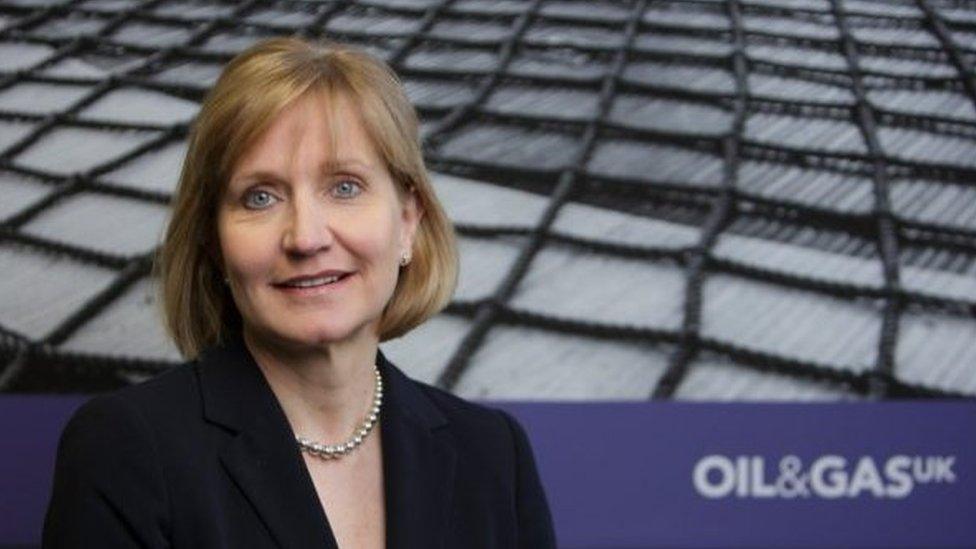
Oil and Gas UK's Deirdre Michie has told industry delegates that the industry wants "the world to be a better place too"
We learned from Equinor on Tuesday that the Rosebank field, north-west of Shetland in 1,100 metres of the Atlantic, is not to have a final investment decision made until spring of 2022. That's while it takes more time to learn from other deepwater developments about ways to design cost out of it. The UK regulator has given it a three-year extension to its licence.
But cheaper oil also means more people getting behind the wheel in old gas-guzzlers to burn the stuff, and to buy cheap air tickets. In the US and the UK, the fall in driving costs were accompanied by tough times for the bus operators.
The Scottish government incurred the fury of airports and airline managers with a U-turn on its plan to halve air departure tax.
It now has to make clear what it's going to do about ground transport - building roads and pricing road use to discourage mileage, or at least to put a marginal price on transport so that the polluter pays.
Emergency
Then if it is serious about "climate emergency", it has to say something about oil and gas production.
Ministers acted swiftly, said a spokeswoman, after being told of the growing imminence of dangerous climate change. They set a new target to achieve net-zero emissions by 2045 at the latest. "We are now looking across our policies to make sure that they align with that increased scale of ambition.
"The domestic oil and gas industry and its supply chain can play a positive role in supporting the transition. We are committed to achieving a net-zero emissions economy in a way that is fair for all."
That may mean being "fair" to those who have invested heavily in the fossil fuel sector, including much of north-east Scotland and the northern isles. It would not be politically easy to turn the taps off.
What role for Westminster, once a new Conservative prime minister is in charge? Who knows? But this does not look like a leadership race that will feature damage to the environment, and nor will it be uppermost in the mind of the eventual winner. Brexit, immigration and winning back friends in business are likely to be higher priorities.
Better world
Back at the Aberdeen conference where Deirdre Michie was seeking a new way of engaging with the environment lobby, she took the offshore engineers' approach: find a way through the challenge. Be inventive. Innovate.
Find better ways to cut the industry's own very high use of fossil fuels. Put offshore skills to work on marine energy. And find ways to capture carbon and store it, economically.
But facing pressure to "keep it in the ground", and investors pressured into divesting from oil companies, the message is to keep drilling in the North Sea and Atlantic waters, rather than rely on importing it over long distances, adding the carbon footprint of the tankers that bring it here.
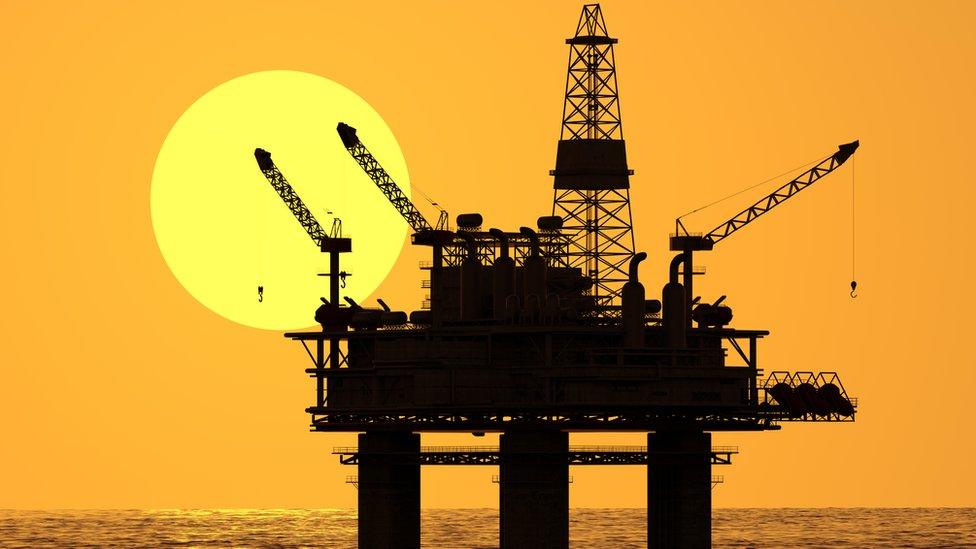
The oil and gas industry is under a new type of political and economic pressure
"While we continue to advocate with facts and evidence, I appreciate that it can sound like corporate speak that doesn't have the emotion or the urgency that society and we, as part of society, are all feeling," Michie told industry figures.
"Anyone and everyone who wants to change the world for the better can work with us to help ensure a fair and just and managed transition and at a pace that will also be required.
"Later this year we'll publish the road map which will set out how we can successfully deliver the vision and our industry's sustainable future, to ensure it continues to contribute to the country in terms of hundreds of thousands of jobs, security of energy supply, billions of pounds in taxes and investment levels, for decades to come."
If that lives up to the advance billing, it will be an important moment for the country's economy, and possibly a turning point for the climate change campaign, at least in this corner of this endangered planet.
- Published12 December 2018
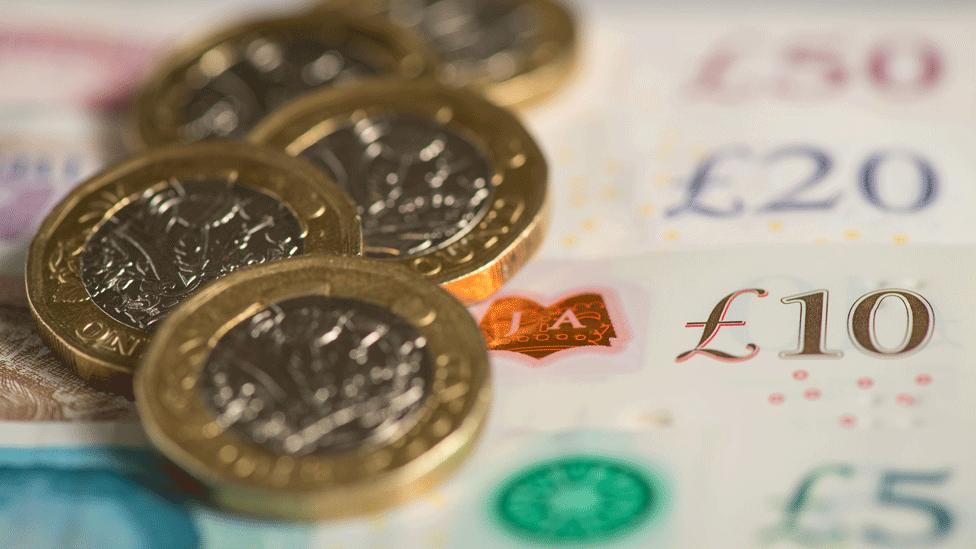
- Published19 February 2019
